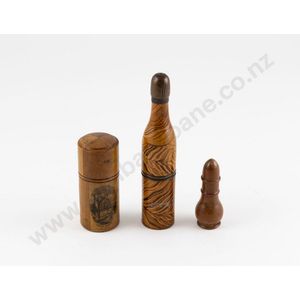Victorian Olive Wood Container Set: 14.5cm, 8cm & 6cm High
Victorian olive wood container, mauchline ware & treen containers, 5.71 in., 3.15 in. & 2.36 in. high
You must be a subscriber, and be logged in to view price and dealer details.
Register Now to view actual auction price for this item.
- Olivewood - Olivewood is a hard, close-grained wood from southern Europe and has a green-to-yellow colour with interesting black-grey marking. It was used in the mid-17th century for marquetry inlay, because its colour provided contrasting decoration to walnut, which is a darkish brown with black veining. Olivewood was also frequently seen as cross-graining on chests of drawers from the mid-17th century onwards.
- Olive Wood - Olive wood is the wood from the olive tree (Olea europaea). Olive trees are native to the Mediterranean region and have been cultivated for thousands of years for their fruit, oil, and wood. Olive wood is a hardwood with a tight and dense grain, known for its distinctive pattern of light and dark brown streaks, which can create a beautiful and unique look in finished products. It is a popular choice for carving, turning, and furniture making, as well as for decorative and functional items such as kitchen utensils, cutting boards, and religious objects.
- Victorian Period - The Victorian period of furniture and decorative arts design covers the reign of Queen Victoria from 1837 to 1901. There was not one dominant style of furniture in the Victorian period. Designers used and modified many historical styles such as Gothic, Tudor, Elizabethan, English Rococo, Neoclassical and others, although use of some styles, such as English Rococo and Gothic tended to dominate the furniture manufacture of the period.
The Victorian period was preceded by the Regency and William IV periods, and followed by the Edwardian period, named for Edward VII (1841 – 1910) who was King of the United Kingdom and the British Dominions and Emperor of India for the brief period from 1901 until his death in 1910.
This item has been included into following indexes:
